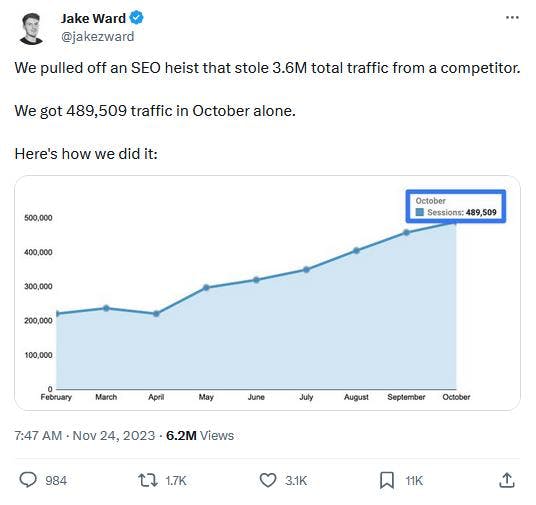The Complete Rundown at OpenAI

I’ve spent the past few weeks in AI content purgatory.
The week of Thanksgiving, Robert and I recorded, and then re-recorded the This Old Marketing podcast as the struggle for OpenAI went down in real time. You can listen here.
If you are interested in what happened at the most important AI company in the world, then you already know the details. But…
The TLDR –
CEO Sam Altman was fired by the OpenAI board for not being honest and transparent (we still don’t know exactly what he did).
OpenAI executives and almost all the employees revolted.
Microsoft, the leading funder of OpenAI, announced they would bring Sam and team to Microsoft.
Sam then announced he was back running OpenAI. All the employees stayed. Most of the board was fired.
Here’s the full Washington Post story.
—–
Now then…
If content creation is something that’s important to you, I would take 58 minutes and listen to this podcast episode from Paul Roetzer of the Marketing AI Institute.
Paul gives a historical rundown about OpenAI and how we arrived at the moment when Sam was fired. As always, history is important.
The TLDR –
Sam Altman, Elon Musk and others founded OpenAI as a nonprofit research lab with the mission to “ensure that artificial general intelligence benefits all of humanity.” This was 2015.
After Elon left, Sam believed they couldn’t move fast enough without more investment to buy chips, servers and the smartest engineers and researchers on the planet. The nonprofit was inhibiting them. So they created a for-profit entity out of the nonprofit that would entice large investors.
It worked. Billions flowed in, including Microsoft at a reported $13 billion.
OpenAI’s current valuation is around $80 billion. OpenAI did $1.3 billion in revenue over the past 12 months and has over 100 million active daily users.
It is clearly one of the most powerful, influential, and financially valuable companies on the planet.
—–
Okay, there’s the mini-history lesson. But it’s important to know because of what just happened.
According to The Information (and Paul, if you listen to his podcast),
“Sam Altman alluded to a recent technical advance the company had made that allowed it to ‘push the veil of ignorance back and the frontier of discovery forward.’ The cryptic remarks at the APEC CEO Summit went largely unnoticed as the company descended into turmoil.”
And then goes on…
“But some OpenAI employees believe Altman’s comments referred to an innovation by the company’s researchers earlier this year that would allow them to develop far more powerful artificial intelligence models, a person familiar with the matter said. The technical breakthrough, spearheaded by OpenAI chief scientist Ilya Sutskever, raised concerns among some staff that the company didn’t have proper safeguards in place to commercialize such advanced AI models, this person said.”
The TLDR –
OpenAI achieved something new in regard to artificial general intelligence, or AGI. Probably something like we would imagine in a science fiction movie.
Sam Altman was likely taking this finding and colliding with the OpenAI mission by being overly aggressive with the strategy. Members of the board and key members of the OpenAI company became so concerned they fired Sam.
—–
And here we are. Sam is back at OpenAI and everything is normal. Right?
I’m not an alarmist by any means, but whatever happened was a big deal. Climate change, politics, Taylor Swift…all very important. Whatever is going on here is THE most important development affecting our world (is that too much? I really can’t tell).
Strap on the seat belts.
All Content Will Be AI Content
According to this Europol report, “experts estimate that as much a 90% of online content may be synthetically generated by 2026.”
Amazing, right?
Here’s an even scarier thought. I think that number is low.
I believe that, as percentages go, 99% of content will be generated by a computer in the next few years.
Google, for one, is having a heck of a time keeping up with the current state of search engine results.
Take a look at this tweet series from Jake Ward (h/t A Media Operator).

Basically, Jake took their competitor’s site map and generated 1,800 articles via AI. In 18 months, Jake effectively stole 3.6 million in total traffic from the other site. He gives a complete play-by-play, which is both helpful and disturbing.
I believe there is an opportunity here for completely human content. There is a large and growing group of people who want trusted, human content sources. This is why I’m so optimistic about content entrepreneurs who are building audiences that know, like and trust them. What a competitive advantage this will be when we are overrun with content where we don’t know who’s creating it. We may be already there.
This is another reason why our theme for Content Entrepreneur Expo (May 5-7th in Cleveland) is how to survive as a content creator in a world of AI content. Early bird pricing ends January 1st.
Saving Local News
My friend Carlos Abler sent Robert Rose and I an email on ways to save local media. We started to email back and forth about ways to save the many local media websites and newspapers around the United States.
Robert and I have been talking for many years on the This Old Marketing podcast about the need to alter the local news business model from selling content – paid subscriptions and advertising – to selling their mission. To do this, a sponsorship would not look like a banner, button or email ad, it would look very similar to selling the naming rights for a stadium.
Let’s take my hometown of Cleveland, Ohio. Our local news source is Cleveland.com and the Cleveland Plain Dealer newspaper. I bought a newspaper the other day. It was about seven total pages and cost three dollars. I have no idea how or why they support such a content product. The online experience isn’t much better. It looks like Biff’s World from Back to the Future II.
At the same time, Progressive Insurance has the naming rights for where the Cleveland Guardians baseball team plays, now called Progressive Field. It used to be called The Jake or Jacobs Field after the former owner. In 2008, Progressive Insurance bought the naming rights for 16 years at a cost of $58 million or $3.6 million per year.
Would a company like Progressive spend $3 million per year to have the naming rights for the local paper? I think it’s possible. How much local journalism could that fund? Wouldn’t Progressive want this kind of positive exposure? And how about Progressive’s employees, most of which live in Northeast Ohio? Aren’t employees the best marketers for an organization and spending money like this is an investment in them and in their communities?
Just to give you an idea, Progressive spent 1.37 billion on advertising in 2022, so $3 million is simply a rounding error.
What needs to happen? These local outlets need to learn to sell differently…like nonprofits, museums and, yes, sports organizations.
Carlos posted a great overview on his LinkedIn page here:
“I really appreciate how Robert Rose and Joe Pulizzi have elevated the idea of using corporate sponsorship, akin to stadium naming rights, as a means to help save local news. Despite deregulation and other factors, news serves as a prime example where private business ownership and public infrastructure implicitly work together.
The practice of sponsoring sports facilities, museum wings, academic chairs, and the like, is not new. However, a key challenge in making this concept a reality is ensuring mutual expectations are met for the businesses receiving such subsidies. The issue of news organizations being gutted by finance-driven ownership must be addressed. Such sponsorships should enhance the quality and compensation of journalism, information services, and core product models, instead of merely being another cost-saving measure for exploitative ownership models.”
I couldn’t have said it better myself. Thanks Carlos!
